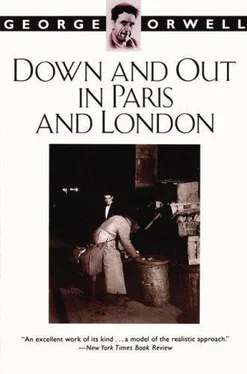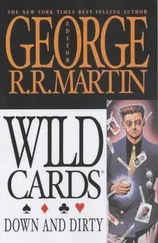George Orwell - Down and Out in Paris and London
Здесь есть возможность читать онлайн «George Orwell - Down and Out in Paris and London» весь текст электронной книги совершенно бесплатно (целиком полную версию без сокращений). В некоторых случаях можно слушать аудио, скачать через торрент в формате fb2 и присутствует краткое содержание. Жанр: Старинная литература, на русском языке. Описание произведения, (предисловие) а так же отзывы посетителей доступны на портале библиотеки ЛибКат.
- Название:Down and Out in Paris and London
- Автор:
- Жанр:
- Год:неизвестен
- ISBN:нет данных
- Рейтинг книги:5 / 5. Голосов: 1
-
Избранное:Добавить в избранное
- Отзывы:
-
Ваша оценка:
- 100
- 1
- 2
- 3
- 4
- 5
Down and Out in Paris and London: краткое содержание, описание и аннотация
Предлагаем к чтению аннотацию, описание, краткое содержание или предисловие (зависит от того, что написал сам автор книги «Down and Out in Paris and London»). Если вы не нашли необходимую информацию о книге — напишите в комментариях, мы постараемся отыскать её.
Down and Out in Paris and London — читать онлайн бесплатно полную книгу (весь текст) целиком
Ниже представлен текст книги, разбитый по страницам. Система сохранения места последней прочитанной страницы, позволяет с удобством читать онлайн бесплатно книгу «Down and Out in Paris and London», без необходимости каждый раз заново искать на чём Вы остановились. Поставьте закладку, и сможете в любой момент перейти на страницу, на которой закончили чтение.
Интервал:
Закладка:
bad luck far better than one can imagine Englishmen
of the same class doing. There are exceptions, of
course. Boris told me of an exiled Russian duke whom
he had once met, who frequented expensive
restaurants. The duke would find out if there was a
Russian officer among the waiters, and, after he had
dined, call him in a friendly way to his table.
« Ah, » the duke would say,
"so you are an old
soldier, like myself? These are bad days, eh? Well, well,
the Russian soldier fears nothing. And what was your
regiment?"
"The so-and-so, sir," the waiter would answer.
"A very gallant regiment! I inspected them in 1912.
By the way, I have unfortunately left my notecase at
home. A Russian officer will, I know, oblige me with
three hundred francs."
If the waiter had three hundred francs he would hand
it over, and, of course, never see it again. The duke
made quite a lot in this way. Probably the waiters did
not mind being swindled. A duke is a duke, even in
exile.
It was through one of these Russian refugees that
Boris heard of something which seemed to promise
money. Two days after we had pawned the overcoats,
Boris said to me rather mysteriously:
"Tell me,
mon ami , have you any political opinions?"
"No," I said.
" Neither have I. Of course, one is always a patriot;
but still--- Did not Moses say something about spoiling
the Egyptians? As an Englishman you will have read
the Bible. What I mean is, would you object to earning
money from Communists?"
"No, of course not."
"Well, it appears that there is a Russian secret
society in Paris who might do something for us. They
are Communists; in fact they are agents for the Bol-
sheviks. They act as a friendly society, get in touch
with exiled Russians, and try to get them to turn
Bolshevik. My friend has joined their society, and he
thinks they would help us if we went to them."
"But what can they do for us? In any case they
won't help me, as I'm not a Russian."
"That is just the point. It seems that they are corre-
spondents for a Moscow paper, and they want some
articles on English politics. If we go to them at once
they may commission you to write the articles."
"Me? But I don't know anything about politics."
«
Merde ! Neither do they. Who does know anything
about politics? It's easy. All you have to do is to copy it
out of the English papers. Isn't there a Paris
Daily Mail ?
Copy it from that."
"But the
Daily Mail is a Conservative paper. They
loathe the Communists."
"Well, say the opposite of what the
Daily Mail says,
then you
can't be wrong. We mustn't throw this chance
away,
mon ami . It might mean hundreds of francs"
I did not like the idea, for the Paris police are very
hard on Communists, especially if they are foreigners,
and I was already under suspicion. Some months
before, a detective had seen me come out of the office
of a Communist weekly paper, and I had had a great
deal of trouble with the police. If they caught me going
to this secret society, it might mean deportation. However,
the chance seemed too good to be missed. That after-
noon Boris's friend, another waiter, came to take us to
the rendezvous. I cannot remember the name of the
street-it was a shabby street running south from the
Seine bank, somewhere near the Chamber of Deputies.
Boris's friend insisted on great caution. We loitered
casually down the street, marked the doorway we were
to enter-it was a laundry-and then strolled back again,
keeping an eye on all the windows and cafés. If the
place were known as a haunt of Communists it was
probably watched, and we intended to go home if we
saw anyone at all like a detective. I was frightened, but
Boris enjoyed these conspiratorial proceedings, and
quite forgot that he was about to trade with the slayers
of his parents.
.
When we were certain that the coast was clear we
dived quickly into the doorway. In the laundry was a
Frenchwoman ironing clothes, who told us that "the
Russian gentlemen" lived up a staircase across the
courtyard. We went up several flights of dark stairs
and emerged on to a landing. A strong, surly-looking
young man, with hair growing low on his head, was
standing at the top of the stairs. As I came up he
looked at me suspiciously, barred the way with his
arm and said something in Russian.
"
Mot d'ordre ! » he said sharply when I did not
answer.
I stopped, startled. I had not expected passwords.
"
Mot d'ordre ! » repeated the Russian.
Boris's friend, who was walking behind, now came
forward and said something in Russian, either the pass
word or an explanation. At this, the surly young man
seemed satisfied, and led us into a small, shabby room
with frosted windows. It was like a very poverty-
stricken office, with propaganda posters in Russian
lettering and a huge, crude picture of Lenin tacked on
the walls. At the table sat an unshaven Russian in shirt
sleeves, addressing newspaper wrappers from a pile in
front of him. As I came in he spoke to me in French,
with a bad accent.
"This is very careless!" he exclaimed fussily. "Why
have you come here without a parcel of washing?"
"Washing?"
"Everybody who comes here brings washing. It looks
as though they were going to the laundry downstairs.
Bring a good, large bundle next time. We don't want the
police on our tracks."
This was even more conspiratorial than I had ex-
pected. Boris sat down in the only vacant chair, and
there was a great deal of talking in Russian. Only the
unshaven man talked; the surly one leaned against the
wall with his eyes on me, as though he still suspected
me. It was queer, standing in the little secret room with
its revolutionary posters, listening to a conversation
which I did not understand a word. The Russians of
talked quickly and eagerly, with smiles and shrugs of the
shoulders. I wondered what it was all about. They would
be calling each other "little father," I thought, and "little
dove," and « Ivan Àlexandrovitch," like the characters in
Russian novels. And the talk would be of revolutions.
The unshaven man would be saying firmly, "We never
argue. Controversy is a bourgeois pastime. Deeds are our
arguments." Then I gathered that it was not this exactly.
Twenty francs was being demanded, for an entrance fee
apparently, and Boris was promising to pay it (we had
just seventeen francs in the world). Finally Boris
produced our precious store of money and paid five
francs on account.
At this the surly man looked less suspicious, and sat
down on the edge of the table. The unshaven one began
to question me in French, making notes on a slip of
paper. Was I a Communist? he asked. By sympathy, I
answered; I had never joined any organisation. Did I
understand the political situation in England? Oh, of
course, of course. I mentioned the names of various
Ministers, and made some contemptuous remarks about
the Labour Party. And what about
Le Sport ? Could I do
articles on
Le Sport ? (Football and Socialism have some
mysterious connection on the Continent.) Oh, of
course, again. Both men nodded gravely. The unshaven
Читать дальшеИнтервал:
Закладка:
Похожие книги на «Down and Out in Paris and London»
Представляем Вашему вниманию похожие книги на «Down and Out in Paris and London» списком для выбора. Мы отобрали схожую по названию и смыслу литературу в надежде предоставить читателям больше вариантов отыскать новые, интересные, ещё непрочитанные произведения.
Обсуждение, отзывы о книге «Down and Out in Paris and London» и просто собственные мнения читателей. Оставьте ваши комментарии, напишите, что Вы думаете о произведении, его смысле или главных героях. Укажите что конкретно понравилось, а что нет, и почему Вы так считаете.












